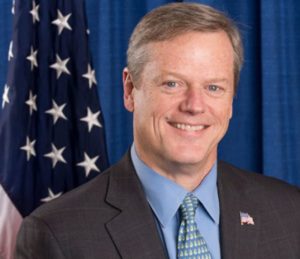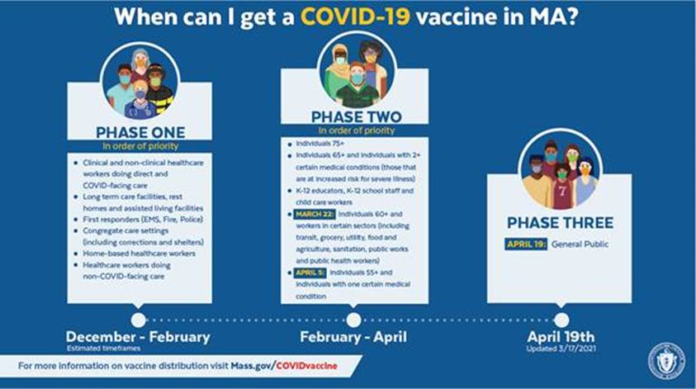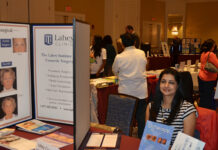BOSTON – The Baker-Polito Administration on Wednesday announced the timeline for all remaining residents to be eligible for a vaccine.
The Administration also announced the weekly distribution of vaccine doses statewide for providers and a new $24.7 million investment in the Administration’s Vaccine Equity Initiative.

Vaccine Eligibility Timeline
Governor Baker announced the dates that all remaining residents and certain worker groups will be eligible for a vaccine.
The Commonwealth’s detailed timeline adheres to the original timeline for the three phases announced in December.
All residents can preregister to book an appointment at a mass vaccination site at mass.gov/COVIDVaccine.
Appointments will be offered based on eligibility and available appointments nearby. It is expected that more sites will come online as part of the preregistration process in April.
Timeline for remaining groups:
- March 22nd: Residents 60+ and certain workers
- April 5th: Residents 55+ and residents with one certain medical condition
- April 19th: General public ages 16 years of age and older
The full timeline is available at mass.gov/COVIDVaccinePhases.
The Administration has received assurances from the federal government that an increased vaccine supply will be available to states soon.
Depending on supply, it could take weeks for people to be notified that an appointment is available at a mass vaccination site.
Dose Update
The Administration provided the weekly update for doses allocated from the federal government.
This week, the state is receiving a modest increase in supply of first doses, approximately 170,000. This includes an unexpected 8,000 doses of J&J vaccine.
In total, the Commonwealth will receive 316,000 first and second doses as part of the state allocation. These figures do not include doses provided through the Federal Retail Pharmacy Program or to Federally Qualified Health Centers.
This week, first doses and second dose state allocations (total doses), were distributed among providers as follows:
- Mass vaccination locations: 101,890
- Health systems and health care providers (excluding CHCs): 99,230
- Community Health Centers: 27,450
- Regional Collaboratives and Local Boards of Health: 59,580
-
- Regional Collaboratives: 40,370
-
- Local Boards of Health: 19,210
- Retail pharmacies (non-CVS)
-
- State allocation: 8,490
- Mobile Clinics supporting long-term care facilities, congregate care, affordable/low-income senior housing and homebound individuals: 19,180
Weekly allocations are subject to change based on federal availability, demand from providers, and obligations to meet second doses. Providers have 10 days to use their doses and must meet specific performance thresholds.
Federal Doses:
In addition to the state allocation, the federal government distributes vaccines to CVS Health sites as part of the Federal Retail Pharmacy Partnership as well as to certain Massachusetts federally qualified community health centers. These quantities fluctuate on a weekly basis and are not counted as part of the state’s weekly allocation.
This week, 106,440 first and second doses have been allocated to the retail pharmacy program and 9,500 doses have been allocated to the federally qualified health centers.
Individuals looking to book appointments across any of these providers should visit mass.gov/COVIDvaccine to learn more.
Vaccine Equity Initiative
The Administration also announced the release of $27.4 million in federal funds to increase trust, vaccine acceptance and administration rates as part of the Administration’s Vaccine Equity Initiative and to meet the needs of priority populations. Recognizing equity as a critical component of the state’s vaccine distribution plan, the Department of Public Health (DPH) is working closely with 20 hardest hit communities in Massachusetts as they identify their specific community needs, further building on existing support.
These federal funds from the Centers for Disease Control and Prevention (CDC) build upon current and past efforts supporting vaccination in these communities disproportionately impacted by COVID-19 and includes partnerships with municipalities, local boards of health, community- and faith-based organizations, community health centers and others to reduce barriers to vaccination. These funds also will provide direct vaccine administration to populations that are not effectively reached through existing vaccine supply channels.
These federal funds include:
- $10.6 million to provide direct assistance with vaccine access, including appointment registration assistance, transportation to vaccination clinics, mobility assistance, medical interpretation, and other supports. These services will be delivered through contracted community-based organizations (CBOs), community health centers (CHCs), and behavioral health providers.
- $5.1 million to invest in community health centers through the Massachusetts League of Community Health Centers to expand vaccination capacity at community health centers, including Community Health Worker Ambassadors.
- $4.7 million to support municipalities and local boards of health through direct funding of the 20 equity municipalities for coordination and support for vaccine clinics and acceptance.
- $4 million to help tailor community outreach and education through direct funding of local community-based and faith-based organizations in the 20 equity municipalities.
- $3 million for direct vaccine administration in community settings by funding qualified organizations to directly administer vaccination to groups not effectively reached by other mechanisms.
These activities will build on DPH-supported initiatives already in progress, such as outreach and collaboration with community and faith-based organizations, increased connections and investment in Community Health Centers, and grassroots neighborhood outreach by teams of trained staff and residents led by Archipelago Strategies Group (ASG), a minority-owned business, and Health Care For All (HCFA).
Other activities already underway include the DPH COVID-19 Vaccine Ambassador Program, which has assisted with dozens of local meetings to answer questions about vaccine, wide dissemination and amplification of the state’s “Trust the Facts. Get the Vax.” multilingual public awareness campaign, and the DPH Community Liaisons who are meeting weekly with representatives from the communities to identify and lift barriers to vaccine access and support community-based solutions.
The Administration’s Vaccine Equity Initiative focuses on 20 cities and towns with the greatest COVID-19 case burden, taking into account social determinants of health and the disproportionate impact of COVID-19 on Black, Indigenous, People of Color (BIPOC). These communities are Boston, Brockton, Chelsea, Everett, Fall River, Fitchburg, Framingham, Haverhill, Holyoke, Lawrence, Leominster, Lowell, Lynn, Malden, Methuen, New Bedford, Randolph, Revere, Springfield, and Worcester.













